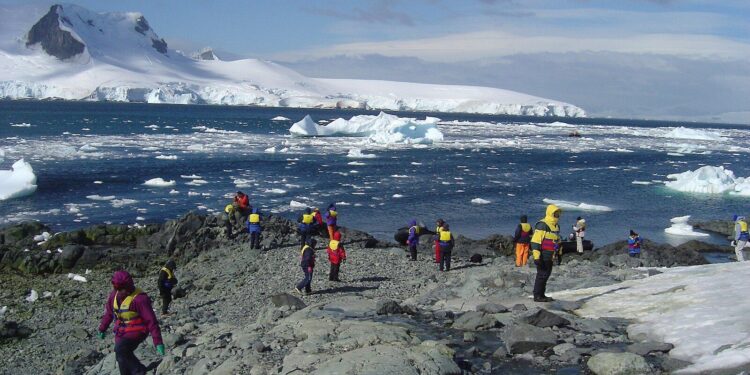Innovative Collaborations: How Antarctic Tourism is Supporting Scientific Research
As federal allocations for scientific exploration in Antarctica face drastic reductions, an unexpected alliance is forming on the frozen continent: tourist cruise operators are stepping up to fund scientific initiatives. In light of budgetary limitations and evolving priorities, these private enterprises are discovering creative methods to back research projects that might otherwise struggle to find financial support. This partnership not only enriches the tourism experience but also plays a crucial role in advancing essential scientific studies within one of Earth’s most delicate ecosystems. This article delves into how these expeditions are merging leisure with research, shedding light on the changing dynamics of Antarctic exploration.
The Role of Tourism in Funding Scientific Research in Antarctica
With federal funding cuts jeopardizing critical research efforts, the growing trend of Antarctic tourism has emerged as an unlikely supporter for scientists. More and more expedition companies and cruise lines are stepping forward to bridge this financial gap by sponsoring various research activities across the region. Such collaborations not only provide essential resources but also allow tourists a unique opportunity to engage with and appreciate the significance of scientific work conducted in one of the planet’s most isolated areas. By partnering with academic institutions, these companies effectively connect leisure travel with serious scientific pursuits.
Research projects funded by tourist contributions often concentrate on pressing issues such as climate change impacts, wildlife conservation, and geological assessments. This funding model empowers researchers to carry out significant fieldwork without compromising quality due to limited budgets. Notable advantages include:
- Access to Advanced Tools: Direct sponsorship enables scientists to utilize sophisticated equipment necessary for effective data collection.
- Heightened Public Awareness: Collaborative endeavors frequently lead to increased visibility regarding environmental challenges.
- Tourist Participation: Visitors can engage directly or observe ongoing scientific activities, deepening their understanding of Antarctic ecosystems.
| Research Focus Area | Tourism Contribution |
|---|---|
| Coping with Climate Change | Analyzing ice melt patterns and their global implications |
| Penguin Population Studies |
Private Sponsorship’s Influence on Conservation Efforts in Antarctica
The emergence of private sponsorship within Antarctic research is transforming how preservation efforts unfold amid dwindling public funding sources. As governmental budgets tighten, innovative partnerships between cruise operators and researchers have stepped up significantly. These collaborations not only supply necessary funds but also involve tourists directly in understanding environmental conservation’s importance. By backing specific studies, cruise lines can offer passengers exclusive insights into fragile ecosystems while nurturing a greater appreciation for this unique environment.
Additionally, these partnerships often aim at addressing urgent matters related to climate change effects and wildlife protection strategies. As researchers conduct vital investigations—such as monitoring penguin populations or assessing melting glaciers—the involvement from private sponsors enhances public awareness about conservation needs significantly. Key benefits from this approach include:
- A Boost in Financial Resources: Private entities can provide monetary support that may be lacking from public sectors. << li >< strong > Greater Visibility:< / strong > Research initiatives gain attention from both tourists and media outlets alike.< / li >
- < strong > Cultural Exchange Opportunities:< / strong > Tourists can take part in educational programs that connect them with both scientists and local communities.< / li >
< / ul >Ethical Considerations: Balancing Tourism With Conservation Efforts In Polar Regions
The increasing accessibility of polar regions presents intricate challenges at the intersection between tourism growth and conservation efforts . With rising concerns over ecosystem health , Antarctica is witnessing a novel response amidst federal funding reductions . Some tourist operators have begun sponsoring important science projects , creating mutually beneficial relationships between economic interests & ecological preservation . This collaboration provides crucial financing while cultivating environmentally conscious travelers eager learn about regional ecology .
This emerging model does raise significant questions regarding long-term sustainability . While financial backing remains essential for ongoing studies , it risks obscuring distinctions between commercial interests & genuine scientific integrity . Stakeholders must prioritize establishing clear guidelines addressing key aspects such as :
- < strong > Research Independence :< / strong > Ensuring all studies maintain objectivity & credibility.< / li >
- < strong > Environmental Footprint :< / strong > Evaluating ecological impacts stemming from increased visitor activity.< / li >
- < strong > Community Inclusion :< / strong > Integrating local perspectives into broader research agendas.< / li >
< ul >< >
<< tr >>
<< th >> Aspect << th >>
<< th >> Challenges<< th >>
<< th >> Opportunities<< th >>
<<< tr >>
<<< tbody >>>
<<< tr >>>
<<< td >> Funding<<< td >>
<<< td>> Reliance upon tourism income<<< td>>
<<< td>> Expanded opportunities for new initiatives<<< td>>
<<< tr >>>
<<< tr >>>
<<< td >> Integrity Issues<<< td>>
<<< td >> Potential biases introduced by sponsors<<< td>>
<<= Enhanced exposure for academic work<< = >>=
<<= = = = <<= = <<= = <= <= <= <=Conclusion: The Path Ahead
As government-funded research faces substantial cutbacks , emerging alliances between Antarctic cruises & academic institutions highlight an innovative solution aimed at sustaining critical investigations within one Earth’s most remote locales . Although heightened tourist presence raises valid concerns surrounding ecological consequences impacting sensitive habitats , collaborative ventures grant researchers access resources previously unavailable due budget constraints alone .
Navigating complexities tied together through environmental stewardship alongside advancing knowledge will be paramount moving forward ; thus ensuring future success hinges upon maintaining equilibrium amongst recreational pursuits alongside rigorous inquiry .










